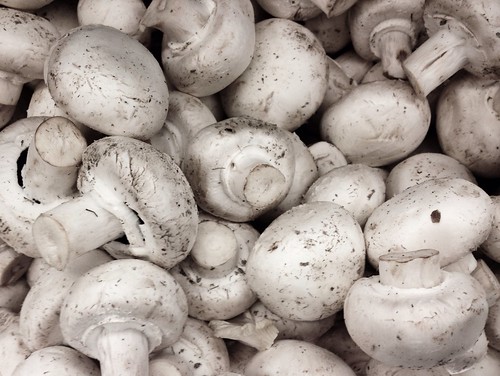Food Poetry Party: Sylvia Plath's "Mushrooms"
To celebrate the launch of her blog The Food Poet, my friend Annelies has put out the call to share a poem, by yourself or another, that inspires you. And so I present to you my favorite poem by my favorite poet, "Mushrooms" by Sylvia Plath, followed by my thoughts at the end.
Overnight, very
Whitely, discreetly,
Very quietlyOur toes, our noses
Take hold on the loam,
Acquire the air.Nobody sees us,
Stops us, betrays us;
The small grains make room.Soft fists insist on
Heaving the needles,
The leafy bedding,Even the paving.
Our hammers, our rams,
Earless and eyeless,Perfectly voiceless,
Widen the crannies,
Shoulder through holes. WeDiet on water,
On crumbs of shadow,
Bland-mannered, askingLittle or nothing.
So many of us!
So many of us!We are shelves, we are
Tables, we are meek,
We are edible,Nudgers and shovers
In spite of ourselves.
Our kind multiplies:We shall by morning
Inherit the earth.
Our foot's in the door.
When I was younger, I wrote a fair amount of poetry. I loved the craft, laboring over how to select and arrange the right words to elicit specific mood. Plath was my muse. She embodied everything I aspired to be as a poet, able to paint lush scenarios with her words that elicited not just visual imagery, but deep emotion.
In this poem, she employs triplets of five-syllable lines, sort of a collective of modified haiku. As a poet, I adored the use of form; with constraint comes the need to exercise great economy of language, and the outcome is often so much more elegant for it. Her language flows effortlessly through the form, with sentences that span more than one triplet. She gives fluidity to the structure.
But where I love her most is in her use of sound. Read the poem aloud, especially this passage:
Soft fists insist on
Heaving the needles,
The leafy bedding,Even the paving.
Our hammers, our rams,
Earless and eyeless,Perfectly voiceless,
Widen the crannies,
Shoulder through holes....
In the first three words, she employs two effs, three tees and five esses. Then over the subsequent three lines there are four words with long E sounds: Heaving, needles, leafy, even. The words themselves hiss and sigh. You almost hear the sound of pine needles giving way as the mushrooms quietly but inexorably force their way up from the earth, the sussuration of nighttime breezes.
I have read this poem countless times over the last 25-plus years, and it never ceases to take my breath away.
What are your favorite food poems?



